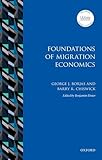Foundations of migration economics / George J. Borjas and Barry R. Chiswick ; edited by Benjamin Elsner.
Series: IZA prize in labor economics seriesPublisher: Oxford ; New York : Oxford University Press, 2019Edition: First editionDescription: xviii, 700 pages : illustrations ; 23 cmContent type:- text
- unmediated
- volume
- 9780198788072
- 019878807X
- 331.62 BOR 23
- JV6217 .B672 2019
| Item type | Current library | Collection | Shelving location | Call number | Status | Date due | Barcode |
|---|---|---|---|---|---|---|---|
 BOOKs
BOOKs
|
National Law School | Reference | MPP Section | 331.62 BOR (Browse shelf(Opens below)) | Not For Loan | 38004 |
Includes bibliographical references (pages 643-662) and index.
Table of contents
Part I: Introduction by the Editor
Part II: Assimilation
1: The effect of Americanization on the earnings of foreign-born men
2: Assimilation, changes in cohort quality, and the earnings of immigrants
3: Is the new immigration less skilled than the old?
4: Seld-selection and the earnings of immigrants
5: Human capital and the labor market adjustment of immigrants: testing alternative hypotheses
6: Are immigrants favorably self-selected? An economic analysis
7: The 'negative' assimilation of immigrants: a special case
Part III: Ethnic networks and neighborhoods
8: The self-employment experience of immigrants
9: Differences in education and earnings across racial and ethnic groups: tastes, discrimination, and investments in child quality
10: Ethnic capital and intergenerational mobility
11: Ethnicity, neighborhoods, and human-capital externalities
12: Ethnic networks and language proficiency among immigrants
13: Do enclaves matter in immigrant adjustment
Part IV: Language and human capital
14: Speaking, reading, and earnings among low-skilled immigrants
15: Educational mismatch: are high-skilled immigrants really working in high-skilled jobs, and what price do they pay if they are not?
Part V: Impact on the economy
16: The economic benefits from immigration
17: The labor demand curve is downward sloping: reexamining the impact of immigration on the labor market
18: Does immigration grease the wheels of the labor market
19: Native internal migration and the labor market impact of immigration
Part VI: Our view on migration
This book presents a series of research articles written over the past four decades by leading economists George J. Borjas and Barry R. Chiswick. Borjas and Chiswick are leading experts on the adjustment of immigrants in their destination country and their impact on the economy. Although they worked separately throughout their careers, and did not always agree, their intellectual interaction has greatly increased understanding of the economic consequences of international migration and immigration policy across developed immigrant receiving countries. This volume brings together their contributions for the first time to demonstrate how public policy issues on immigration have evolved over time.0An in-depth analysis of the key issues relating to international migration Foundations of Migration Economics explores the assimilation of immigrants, focusing on the earning changes of immigrants with a longer duration in the host economy; how immigrant networks and ethnic enclaves influence the labor market and linguistic adjustment of immigrants; determinants of language proficiency and to what extent pre-migration skills are effectively employed by the destination; and the effect0of immigration on the earnings of earlier waves of immigrants and native-born workers.

There are no comments on this title.